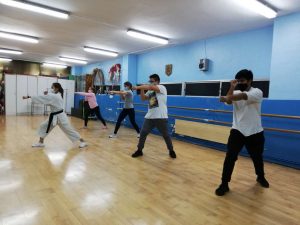Karate is a form of martial art with an origin in Japan. The word “Karate” means empty hand, and unarmed form of self-defence, that strengthens their bodies trough balance and breathing techniques to reach their peak potential.
Studying karate goes beyond learning to fight. It offers kids the chance to develop both physically and emotionally, getting to better know themselves and allowe them to overcome their limits. Karate is not a sport; rather, this style of physical and mental
challenge is a lifestyle, one that requires the full commitment of the fighter’s mind and
body. As a result, the self-discipline, self-control and ethical conduct developed in
martial arts classes extends into other areas of the child’s life. The use of their own
energy and a positive attitude are vital. The techniques they learn not only give them the confidence to defend themselves but also the strength to address difficult situations in their daily lives.

Apart from using the correct technique, concentration and respect are key. When
training karate you train for life, where we are all equal.
Resilience is also developed when children study martial arts. Young karate students
who are confronted by bullies summon their learned resistance and coping mechanisms to handle the threat. The resilience they build transfers over the academic performance and social and emotional effectiveness. Their improved self-esteem helps them brush away their vulnerability.
Multiple studies have shown that practicing martial arts benefits teenagers in general, in particular those with behavioural problems or emotional distress.
GOALS:
- Higher self-esteem and assertiveness
- Improve physical condition and motor skills by practicing cardio-vascular work which helps release adrenaline and stress.
- Find the right balance between body and mind, which benefits concentration leading to better school results
- Karate is not oriented towards fight. It is all about boosting self-confidence and enabling us to be ready to defend ourselves showing good decision-making skills and reacting, when put under pressure, in a calm and less defiant manner.
- Better self-awareness, accepting rules of coexistence and your own self.
- Encourage good-nature rivalry, avoiding conflict and with respect for equality.
“The enemy is fear, love is the armour”
David Carradine (1936-2009)